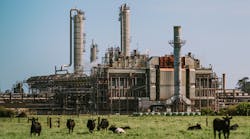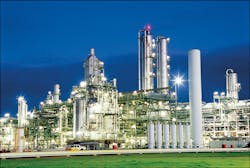Late last year, Methanex, a producer and supplier of methanol, was awarded a gold medal sustainability rating from EcoVadis, an assessment platform for environmental, social, and ethical performance ratings for global supply chains. The award ranks Methanex among the top 5% of companies assessed at EcoVadis.
Methanex started as a single production facility and has grown into a global supplier for markets in Asia Pacific, North America, Europe, and South America. The company is headquartered in Vancouver, Canada, with methanol production sites in the U.S., New Zealand, Trinidad, Chile, Egypt, and Canada.
Methanol is a chemical building block and ingredient in hundreds of consumer and industrial products, such as clothing, construction materials, automotive parts, pharmaceuticals, and other everyday items.
Waterfront Shipping, the majority owned subsidiary of Methanex, is a global marine transportation company, specializing in the transport of methanol and clean petroleum products. The use of methanol as a cleaner burning alternative marine fuel was pioneered by Waterfront Shipping and its shipping partners.
“Our vessels have over 123,000 safe operating hours on methanol,” says Katey Grist, director of corporate sustainability at Methanex. By 2023, approximately 60% of the long-term shipping fleet, 19 vessels in total, will have the capability to run on methanol. “Adoption of methanol as a marine fuel has been gaining momentum, and we estimate in the next three to four years there will be over 100 dual-fueled vessels on the water,” Grist says.
Sustainability has been part of the corporate strategy at Methanex for several decades. The Methanex corporate strategy—maintaining global leadership, preserving a low-cost position, and striving for operation excellence—are rooted in the safety and environmental principles of Responsible Care Ethic and Principles for Sustainability, a United Nations-recognized chemical industry initiative that informs the governance and management of environmental and social issues. “We have been verifying all of our sites globally against these since 1994,” Grist says.
To expand on its sustainability mandate, Methanex has supported the mission at the top levels and invested in key personnel. “We’ve integrated sustainability more broadly into our corporate governance, corporate strategy and risk management processes, and is a key deliverable for senior-level leaders,” Grist says.
The Methanex board of directors has oversight of ESG and is responsible for understanding and addressing emerging trends, regulations, risk, and opportunities, and the company has also made strong investments in sustainability personnel. The company’s vice president of responsible care has had a critical role in shaping sustainability initiatives for decades, but in the last few years, Methanex added three sustainability-related roles: senior vice president of low carbon solutions, vice president of corporate sustainability, and director of corporate sustainability. The newest role focused on low carbon solutions was created January 2023, and is part of one of two leadership teams created to address two of the company’s major environmental risks: (1) greenhouse gas emission from operations, and (2) the company’s role in the transition to a low-carbon economy. “These teams are exploring lower and low-carbon pathways to make methanol using our existing asset portfolio,” Grist says.
The senior vice president of low carbon solutions is responsible for assessing opportunities to develop new markets for low carbon methanol, lowering the company’s carbon footprint, and supporting long-term sustainability for assets and license to operate.
The EcoVadis gold medal assessment focuses on 21 sustainability criteria that are grouped into four themes: environment, labor & human rights, ethics, and sustainable procurement. The ratings company is a partner for sustainability assessments with Together for Sustainability (TfS), an initiative founded by six companies in the European chemical industry, BASF, Evonik, Bayer (now Covestro), Lanxess, Solvay and Henkel. Methanex has long-term relationships with several of those companies. “As EcoVadis' assessments and ratings grew in importance with our customers, they began to walk us through the initiative, leading us to engage directly with EcoVadis and go through the assessment process,” Grist says.
Working with EcoVadis helped the company better understand a broad range of sustainability topics in addition to environment, such as labor and human rights and ethics. “EcoVadis’ approach to continuously updating its ratings’ scale, thereby increasing expectations of the companies they are assessing, has brought its challenges but also carries with it opportunities for continuous improvement,” Grist says.
Methanex is focused on the safety performance of the company as a whole, as well as the many contractors that work on-site. The company culture is centered around ethical and honest behavior, which is supported by annual training and employee programs. Cybersecurity is part of the company’s sustainability focus also. The company performs regular third-party assessment, as part of the strategy and roadmap cycle for the cybersecurity program, and in 2022, it did a cybersecurity crisis simulation.
“We are committed to operating our manufacturing assets to continuously improve efficiency and achieve ongoing greenhouse gas (GHG) intensity reduction. To that end, we have committed to reducing our Scope 1 and Scope 2 GHG emission intensity from manufacturing by 10% by 2030 from 2019 levels,” Grist says. For more on global sustainability standards and greenhouse gas emissions regulations, click here.
For the last two years, Methanex has identified, evaluated, and implemented efficiency and emissions reduction projects. In 2022, Methanex announced a multi-million-dollar investment to improve technology for the distillation columns at the New Zealand plant for execution in 2023 and 2024. The project has the potential to reduce the site’s carbon emissions by more than 50,000 TPA (tonnes per annum). Grist said that’s the equivalent of taking 20,000 cars off the road.
“We are also evaluating the potential that carbon capture, utilization and storage (CCUS) holds for reducing our Scope 1 emissions from manufacturing,” Grist says. CCUS is the process of capturing carbon dioxide from fuel combustion or industrial processes, purifying and compressing the carbon dioxide, and transporting it via pipeline to either be reused as a feedstock or be stored underground in deep geological formations. Grist says CCUS has the potential to reduce 75 to 85% of a manufacturing site’s Scope 1 and 2 GHG emissions.


